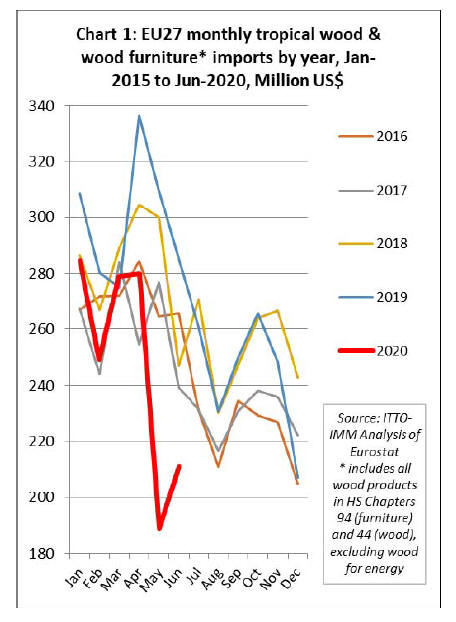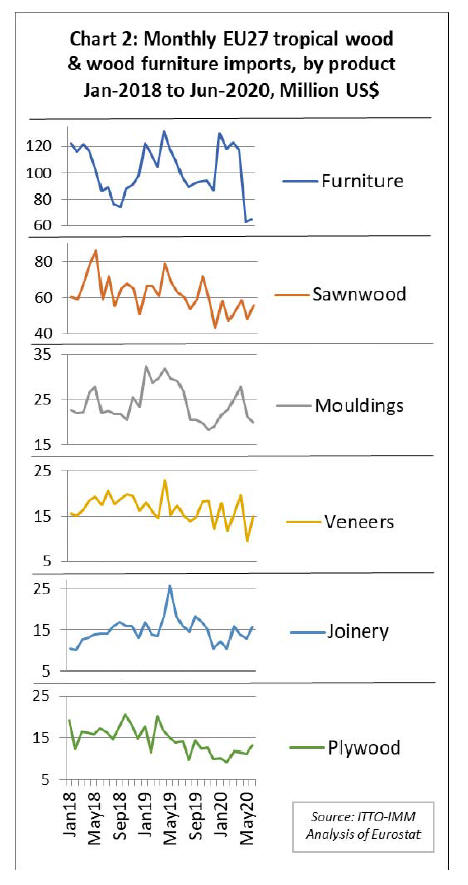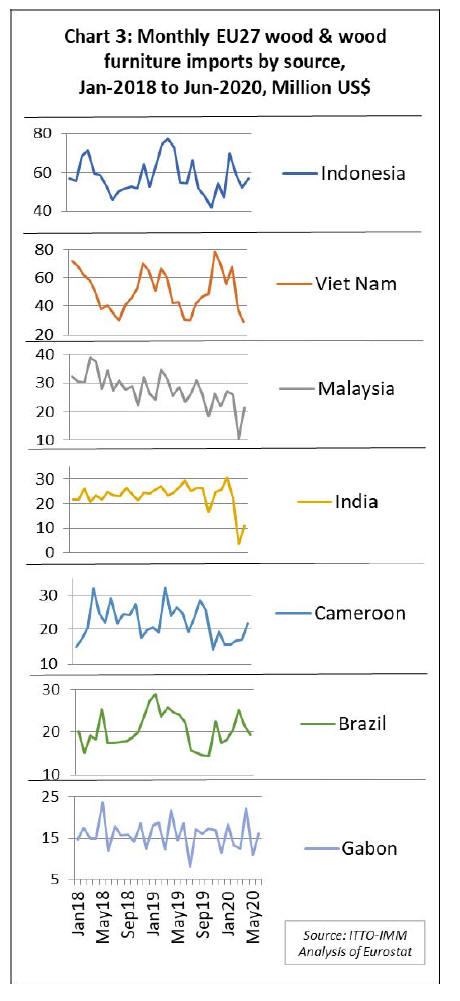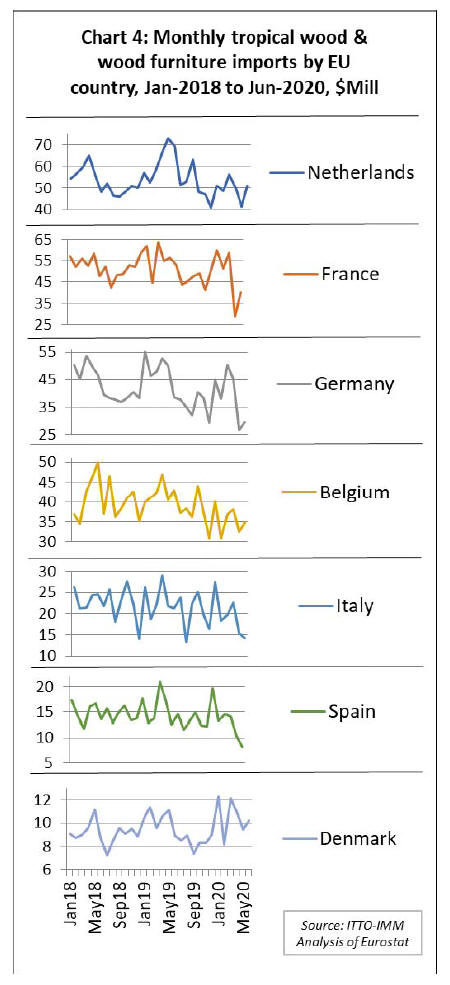|
Report from
Europe
Downturn in EU27 tropical imports may be less severe
than forecast
The downturn in EU imports of wood and wood furniture
products during the initial period of the COVID-19
pandemic may be less severe than first forecast. As
expected, EU27 (i.e. excluding the UK) tropical wood and
wood furniture product imports fell sharply in May in
response to supply side problems and the lockdown
measures in most of the main EU markets, losing around
one third of value against the five-year average for the
month.
However, imports were already recovering in June, a
month which in a more typical year is when imports tend
to slow before the summer holiday period (Chart 1).
Imports during June were only around 20% below the 5-
year average for that month. In total, EU27 imports of all
tropical wood and wood furniture products in the first half
of 2020 were US$1.49 billion, 17% less than the same
period in 2019.
There is a reasonable chance that, if the recovery
continues over the summer months, overall imports of
tropical wood and wood furniture in 2020 will not be too
far below 2019 or the five-year average.
This does assume, however, that there is no significant
uptick in COVID-19 cases in the EU with the onset of
winter leading to widespread resumption of lockdown
measures. As things stand, there is a still concern in the
EU about the possibility of a second wave.

More positively, anecdotal reports suggest that the DIY
sector in the EU remained quite buoyant in some countries
throughout the lockdown months with many people taking
the opportunity to carry out home improvement work. In
those EU countries with less stringent lockdowns, such as
the Netherlands and Sweden, commercial construction and
some manufacturing activity also continued, at a slower
pace but without interruption.
Another reason for optimism is the agreement reached
between the leaders of the 27 EU Member States at a
summit on 21st July 2020 on a comprehensive fiscal
stimulus package worth €1.85 trillion over the next seven
years.
The package consists of a €1.1 trillion budget, 30% of
which will be spent on tackling climate change, and a
further €750 billion in grants and loans, all of which must
be tied to meeting the bloc¡¯s carbon emission-cutting
targets. This has potential to create new market
opportunities for timber products in the EU.
EU27 tropical wood furniture imports down in the first
half of 2020
The path of decline and recovery in EU27 tropical wood
and wood furniture imports varied widely between product
groups (Chart 2). EU27 imports of tropical wood furniture
started the year strongly but fell sharply in April and May
with only a slight recovery in June. Total EU27 wood
furniture imports from the tropics in the second quarter of
2020 were 19% less than the average for the same period
in the previous 5 years.
At US$616 million, EU27 imports of tropical wood
furniture in the first six months of 2020 were 12% less
than the same period last year.

EU27 imports of tropical sawnwood were already weak in
the first quarter of 2020 and remained at a historically low
level in the second quarter. Total EU27 sawnwood
imports from the tropics in the second quarter of 2020
were 21% less than the average for the same period in the
previous 5 years.
At US$320 million, EU27 imports of tropical sawnwood
in the first six months of 2020 were also 21% down on the
same period last year. In quantity terms, the EU27
imported 382,000 m3 of tropical sawnwood in the first six
months of 2020, 21% less than the same period last year.
EU27 imports of tropical hardwood decking/mouldings
started the year particularly slowly and were just building
momentum when the lockdown measures were first
implemented in March. This led to imports falling sharply
in May and June. EU27 imports of decking/mouldings
during the second quarter of 2020 were 8% below the
average for the same period in the previous 5 years.
At US$139 million, EU27 imports of tropical hardwood
decking/mouldings in the first half of 2020 were 23% less
than the same period last year. In quantity terms, the EU27
imported 88,500 tonnes of tropical decking/mouldings in
the first six months of 2020, 17% less than the same
period last year.
EU27 imports of hardwood veneer from the tropics fell
very sharply in May, to only around 50% of the long-term
average for that month but recovered ground quickly in
June. Overall EU27 imports of tropical hardwood veneer
in the second quarter of 2020 were 21% below the average
for the same period in the previous 5 years.
EU27 imports of tropical hardwood veneers were US$89
million in the first half of 2020, 14% less than the same
period last year. In quantity terms, the EU27 imported
140,000 m3 of tropical veneer in the first six months of
2020, 10% less than the same period last year.
EU27 imports of joinery products from the tropics (much
of which comprises laminated window frames and kitchen
tops, together with finished doors) held up well during the
COVID lockdown period, with no significant decline in
May and June.
Overall EU27 imports of tropical joinery products in the
second quarter of 2020 were only 6% below the average
for the same period in the previous 5 years. The EU27
imported tropical joinery products with a total value of
US$81.2 million in the first six months of 2020, 24% less
than the same period last year.
EU27 imports of tropical plywood, already declining
before the lockdown period, fell sharply in the second
quarter of 2020, 22% below the average for the same
period in the previous 5 years. EU27 imports of tropical
plywood were US$67.4 million in the first half of 2020,
29% less than the same period in 2019. In quantity terms,
imports of tropical plywood were 112,000 m3 in the first
six months of 2020, 28% less than the same period last
year.
EU27 imports from Indonesia better than expected in
May and June
The fortunes of individual tropical supply countries also
varied widely in the EU27 market during the lockdown
period (Chart 3).
EU27 imports of wood and wood furniture from
Indonesia, which are dominated by garden furniture,
decking and plywood, tend to be strongest in the spring
season.
The sharp decline in imports from Indonesia in April this
year, at a time when trade is usually rising, did not bode
well.
However, trade held up better than expected in May and
June, perhaps bolstered by the continuing strength of
demand for exterior furniture products and decking.
Overall, EU27 imports of wood and wood furniture from
Indonesia in the second quarter of 2020 were 12% below
the average for the same period in the previous 5 years.
EU27 imports of these products from Indonesia were
US$340 million in the first half of 2020, 16% less than the
same period in 2019.
In contrast to Indonesia, EU27 imports from Vietnam are
dominated by interior furniture and tend to be strongest at
the turn of the year, in time for the January sales, and to be
very slow during the summer and early autumn. While
EU27 imports from Vietnam did fall very sharply in May
and June, the decline was not significantly out of
alignment with the seasonal fall that usually happens at
this time of year.
Overall EU27 imports of wood and wood furniture from
Vietnam in the second quarter of 2020 were only 8%
down on the average for the same period in the previous 5
years. EU27 imports of these products from Vietnam were
US$337 million in the first half of 2020, 5% less than the
same period in 2019.
The full effects of COVID-19 on EU imports from
Vietnam will only become truly apparent later this year
when furniture products for next season begin (or fail) to
arrive.
EU27 imports of wood and wood furniture products from
Malaysia, which were sliding before onset of the
pandemic, suffered a very sharp decline in May, but then
rebounded quite strongly in June. Overall, EU27 imports
from Malaysia were down 40% in the second quarter of
this year compared to the average for the same period in
the previous 5 years.
EU27 imports of wood and wood furniture from Malaysia
were US$133 million in the first half of 2020, 24% less
than the same period in 2019. The decline was apparent in
all four of the main product groups supplied by Malaysia
into the EU; interior furniture, sawnwood,
mouldings/decking, and joinery.
EU27 imports from India suffer severe decline this year
EU27 imports of Indian wood and wood furniture
products, dominated by interior furniture, suffered a very
severe decline in May, falling to negligible levels during
the month and rebounded only quite weakly in June.
Overall, EU27 imports from India were down 38% in the
second quarter of this year compared to the average for the
same period in the previous 5 years. EU27 imports of
wood and wood furniture from India were US$118 million
in the first half of 2020, 21% less than the same period in
2019. This was the first reversal for several years of a
long-term rising trend in imports from India.
EU27 imports from Cameroon are dominated by
sawnwood and tend to be volatile even in a ¡°normal¡± year.
This year the trade trend has been even more unusual and
less predictable. EU27 imports from Cameroon were very
low at the end of 2019 and the opening weeks of this year
and even picked up slightly during the COVID lockdown
period.
EU27 imports from Cameroon in the second quarter of
2020 were down 25% against the average for the same
period in the previous 5 years. However, they were 10%
more than the extremely weak level of trade in the first
quarter of this year. Overall, EU27 imports of wood and
wood furniture from Cameroon were US$105 million in
the first half of 2020, 26% less than the same period in
2019.

EU27 imports of tropical hardwoods from Brazil, mainly
sawnwood and decking, held up quite well during the
lockdown period. Imports from Brazil were higher in the
second quarter this year compared to the average for the
same period in the previous five years.
However, this follows a period of continuous growth
between 2015 and 2019 and imports from Brazil during
the second quarter of this year were 21% less than the
same period in 2019. Overall, EU27 imports of wood and
wood furniture from Brazil were US$122 million in the
first half of 2020, 21% less than the same period in 2019.
For the first time for many years, if sawnwood and
decking/mouldings are considered together, Brazil this
year has emerged as the largest tropical supplier of this
product group to the EU, overtaking both Cameroon and
Malaysia which formerly dominated this trade.
The lockdown appears to have had very little impact on
EU27 imports from Gabon. Overall EU27 imports of
wood and wood furniture from the country, which consist
mainly of sawnwood and veneer, in the second quarter of
2020 were down only 5% against the average for the same
period in the previous 5 years.
Although imports of sawnwood from Gabon weakened
slightly in the second quarter this year, this was offset by a
rise in veneer imports. Overall, Overall, EU27 imports of
wood products from Gabon were US$93 million in the
first half of 2020, 10% less than the same period in 2019.
EU27 imports from most other tropical wood and wood
furniture supplying countries also fell sharply in the first
half of 2020 including Congo (-23% to US$35 million),
Cote d¡¯Ivoire (-29% to US$24 million), Ghana (-19% to
US$13 million), Peru (-29% to US$10 million), DRC (-
54% to US$4.7 million) and Bolivia (-36% to US$5.9
million). Indirect EU27 imports of tropical hardwood
products (mainly plywood) also fell from China (-24% to
US$15 million) and the UK (-28% to US$8.8 million).
However, one tropical country increased trade with the
EU27 during the first half of the year: imports from
Ecuador increased 28% to US$32 million, presumably
benefitting from expansion of the renewable energy sector
(balsa wood is widely used for wind turbines).
Impact of COVID-19 varies across member states
Chart 4 highlights that the impact of COVID-19 on
imports of tropical wood and wood furniture on individual
EU27 countries has varied widely, dependent on
underlying economic and trade trends before the onset of
the pandemic, the differing level of each country¡¯s
exposure to the pandemic, and variation in the timing and
scope of the policy response.
Due to the integrated nature of the EU market, for those
countries like Belgium and the Netherlands which
distribute a significant proportion of products to other EU
countries, the trends are not necessarily driven by the
domestic market situation.
The Netherlands is currently the largest destination for
tropical wood and wood furniture imports. Imports into the
country were less affected than most other major
destinations during the lockdown period.
The Dutch government won plaudits earlier in the
pandemic for a so-called ¡°intelligent lockdown¡± strategy
that relied on people abiding by social-distancing
measures while keeping large parts of the economy open.
Netherlands imports of tropical wood and wood furniture
were down 11% in the second quarter of this year
compared to the average for the same period in the
previous 5 years. In total, Netherlands imports of tropical
wood and wood furniture were US$299 million in the first
half of 2020, 21% less than the same period in 2019.
This is a large decline, but it follows a particularly buoyant
year for tropical wood imports in the Netherlands in 2019.
Particularly sharp fall in French imports in May
France imports of tropical wood and wood furniture
started the year quite strongly before falling very sharply
in May. In June there were signs of a robust rebound.
France's lockdown was imposed on 17 March, but
restrictions began to ease from 11 May.
Overall, France imports of tropical wood and wood
furniture were down 19% in the second quarter of this year
compared to the average for the same period in the
previous 5 years. In total, France imports of tropical wood
and wood furniture were US$290 million in the first half
of 2020, 15% less than the same period in 2019.
Signs of weakness in the German economy contributed to
slowing German imports of tropical wood and wood
furniture in 2019. A partial recovery in trade in the
opening weeks of 2020 was halted with the onset of the
pandemic.
German imports of tropical wood and wood furniture fell
very sharply in May and were yet to show any real
recovery in June. In total, German imports of these
products were down 27% in the second quarter of this year
compared to the average for the same period in the
previous 5 years.
For the first half of 2020, German imports of tropical
wood and wood furniture were US$234 million, 20% less
than the same period in 2019.
This is despite Germany managing to keep the number of
corona cases relatively low compared to many European
neighbours and the easing of lockdown measures since
April.

Belgium was hit particularly hard early in the pandemic,
encouraging the government to introduce tougher
restrictions than many of its neighbours. Nevertheless,
trade has continued to flow and, in terms of tropical wood
and wood furniture imports, Belgium has seen less of a
downturn than most of its neighbours.
Belgium imports of tropical wood and wood furniture
products were down 18% in the second quarter of this year
compared to the average for the same period in the
previous 5 years. In total, Belgium imports of tropical
wood and wood furniture were US$213 million in the first
half of 2020, 16% less than the same period in 2019.
Like Belgium, Italy was hit early and hard by the
pandemic leading to imposition of a tough national
lockdown starting on 7 March. The three-month lockdown
took a heavy toll on the economy. The Italian government
forecasts that GDP will contract 8% in 2020, while
analysts see a 10% decline. Italy¡¯s imports of tropical
wood and wood furniture fell sharply in May and
continued to slide in June.
Imports were down 27% in the second quarter of this year
compared to the average for the same period in the
previous 5 years. In total, Italy¡¯s imports of tropical wood
and wood furniture were US$117 million in the first half
of 2020, 16% less than the same period in 2019.
Spain is another European country hit particularly hard by
the pandemic. Spain started easing the lockdown, one of
the strictest in Europe, in phases from 4 May. Spain¡¯s
imports of tropical wood and wood furniture fell steeply in
May and this trend continued in June.
Overall, Spain¡¯s imports of tropical wood and wood
furniture were down 30% in the second quarter of this year
compared to the average for the same period in the
previous 5 years. In total, Spain¡¯s imports of tropical wood
and wood furniture were US$80 million in the first half of
2020, 16% less than the same period in 2019.
Denmark is unusual for experiencing a rise in tropical
wood and wood furniture imports this year, despite the
pandemic. In total, Denmark¡¯s imports of tropical wood
and wood furniture were US$63 million in the first half of
2020, 2% more than the same period in 2019.
Imports remained strong even as much of the rest of
Europe went into lockdown. Danish imports of tropical
wood and wood furniture products were up 12% in the
second quarter of this year compared to the average for the
same period in the previous 5 years.
Denmark¡¯s imports from Vietnam, the largest supplier,
increased 10% in the first 6 months of this year, while
imports from Ecuador were up 50%. Ecuador overtook
Brazil and Indonesia to become Denmark¡¯s second largest
tropical wood supplier in the first half of 2020. Denmark is
a primary location for manufacture of wind turbines in the
EU creating demand for Ecuadorian balsa wood.
Denmark was one of the first countries in Europe to
emerge from lockdown. According to a recent
international survey by the Pew research Centre, 95% of
people in Denmark believe their government did a good
job in handling the crisis. That is the highest rating for any
country in the analysis, which encompassed 14 advanced
economies.
|